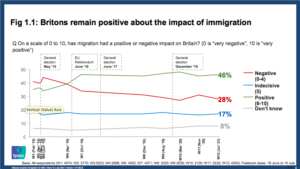Public attitudes to immigration are more positive than negative and most people would now support British businesses being allowed to recruit from overseas to address staff shortages, according to a new report by British Future
‘Immigration: A changing debate’ draws on the latest findings from Ipsos MORI research that has tracked changing public attitudes to immigration across twelve waves of research since 2015.
It reveals a continuing trend of the public feeling that immigration has a positive impact (46%) more than a negative impact (28%) on Britain. When the tracker survey was conducted in February 2015, by comparison, it found only 35% were positive and 41% were negative.

The latest survey finds that the immigration debate may now be more about fairness and control than about numbers, with public consent for immigration where it is needed in the economy. Nearly twice as many people favour an approach to immigration that prioritises the government having control over who can settle in the UK, whether or not that reduces numbers (44%) over a system that is focused on keeping immigration numbers low (24%).
With labour shortages currently causing problems in sectors like social care, haulage and hospitality, with knock-on effects for supermarkets and food outlets, the research also asked whether the public would be happy for employers to recruit from overseas to fill gaps. It finds:
- Two thirds of the public (65%) agree that employers should be allowed to recruit from overseas for any job where there are shortages.
- 77% of the public say recruitment from overseas should be allowed for positions in key services such as health and social care. Just 13% say it should not be allowed. Support rises to 86% among people aged over 65.
- 67% say recruitment from overseas should be allowed for temporary seasonal work in sectors such as fruit-picking and hospitality. Just 21% say it should not be allowed.
- Most of the public (55%) also support recruitment from overseas for lower-skilled jobs that are hard to fill from within the UK. Three in ten (30%) say it should not be allowed.
The results suggest that the government has political space for selective relaxations of immigration policy to allow recruitment to fill skills and labour gaps where needed, while employers also look at longer-term issues like training, conditions and pay.
This year sees a new balance in immigration attitudes. Roughly twice a year since 2015 this survey has asked the public if they would prefer immigration to increase, decrease or remain at its current level. The number of people who want to reduce immigration is now at its lowest level in the series (45%), while more people than ever before would be happy for immigration to increase (17%). For the first time, the proportion of people wanting to reduce immigration (45%) is on a par with the 46% who either want to keep it at current levels (29%) or higher (17%).
The report also finds that only 12% of the public say they are currently satisfied with how the government is handling immigration, compared to 55% who say they are dissatisfied.
Sunder Katwala, Director of the independent thinktank British Future that led the research, said:
“Public attitudes to immigration are warmer today than at any point since 2015, as opinion has gradually shifted since 2016.
“The debate has moved on from the numbers fixation of the last decade. People still want an approach that offers fairness and control – but there is public consent for the immigration that our economy needs.
“It means the government has political space to allow more recruitment from overseas to fill the workforce gaps causing shortages, while employers address longer-term issues like training and pay.”
Gideon Skinner, Research Director at Ipsos MORI, said:
“As recent stories have highlighted, even though it may have slipped down the public agenda in recent years, immigration continues to have important social and economic implications for the country, and understanding public views as the situation changes is vital – with many still thinking it is discussed too little.
“The public mood has shifted over time to become more positive, and there is clear support for using immigration to help fill job shortages in key sectors. But opinion is still not unanimous on key questions such as the total level of immigration, or on the best system to deal with refugees (even before Afghanistan), which means the debate is still not over.”
Neil Carberry, Chief Executive of the Recruitment & Employment Confederation (REC), said:
“The UK is experiencing a serious shortage of labour right now, affecting every sector across the country. Re-opening the economy has created a short-term crisis, but a number of factors mean that the jobs market will remain tight for years to come.
“While businesses need to look to how they build their future workforces, it’s vital that government prioritises solving the immediate crisis. One way to do that is by making sure the new immigration system flexes when there is evidence of skills and labour shortages, allowing employers to hire workers from abroad to help fill gaps in essential sectors like logistics. As this timely research makes clear, this would be a popular move as well as making logical sense – we’re asking government to act now and help solve these chronic shortages.”
The publication also includes sections on public attitudes to new immigration from Hong Kong and to UK refugee protection, though fieldwork was conducted prior to the refugee crisis in Afghanistan.













